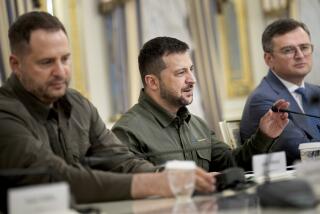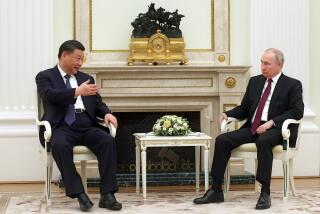Yeltsin Given VIP Treatment on U.S. Arrival
WASHINGTON — Still flush with his victory last week as the first popularly elected leader in Russian history, Boris N. Yeltsin arrived in America on Tuesday to claim the reward his supporters say he has finally earned--international recognition as Mikhail S. Gorbachev’s equal.
From the moment Yeltsin and his entourage of economic and foreign policy advisers stepped off their chartered Aeroflot jetliner at Andrews Air Force Base, Md., it was clear that his second visit to the United States would be markedly different from his first.
In 1989, Yeltsin was largely ignored by senior Bush Administration policy-makers who were determined to do nothing to undermine Gorbachev’s status as Soviet leader.
This time, however, Yeltsin’s standing as the popularly elected president of the largest and most important of the Soviet Union’s 15 republics has earned him the kind of reception normally reserved for heads of state. There are meetings with President Bush and senior Cabinet officers, a day on Capitol Hill with congressional leaders and a hectic schedule crammed with receptions, official dinners and speeches aimed at giving Washington’s power elite a closer look at the man who could become Gorbachev’s heir.
On his last trip to Washington, the gregarious Siberian had to use a White House back entrance when he arrived for a brief session with National Security Adviser Brent Scowcroft. Now Boris Nikolayevich Yeltsin will be walking in the front door when he shows up for an hourlong session Thursday with Bush.
“This is Yeltsin’s pay-back for a rather unsatisfactory visit to Washington the last time around,” said Abe Becker, a specialist in Soviet affairs with the RAND Corp. in Los Angeles. “This time, he gets the red-carpet treatment, and that, in the eyes of the Soviets back home, helps him to establish his equality with Gorbachev as a world figure.”
In brief arrival remarks Tuesday, Yeltsin said he hopes his four-day visit will create “a direct dialogue between Russia and the United States” that can lead to increased economic cooperation. “We want to develop contacts with political leaders and the business community to develop direct Russian-American ties in the framework of relations between the Soviet Union and the United States,” he said.
The visit comes at a critical time in superpower relations as the Administration ponders the changes buffeting the Soviet Union and tries to decide how best to respond to them.
During his scheduled stops in Washington and New York, Yeltsin clearly hopes to court U.S. investment and win support for his long-range plans for radical economic reform. Even so, Russian Federation officials have not disguised the fact that the visit is designed in part to burnish Yeltsin’s image as a statesman who, as the Soviets redefine their union and devolve more authority to the constituent republics, should be treated on a par with Gorbachev.
“Mr. Yeltsin will be talking about the fact that Russia will be joining the European house as a sovereign entity and deserving of recognition as such,” said Viktor Yugin, a deputy in the Russian Federation Parliament who arrived in Washington a few days ago as part of the advance team hastily assembled for Yeltsin’s visit. Russians, he added, view “this as a trip by the sovereign leader of a sovereign state.”
That is still not quite how the Bush Administration views the visit. While Yeltsin is seen more as Gorbachev’s ally than his rival at the moment, his visit--at the invitation of congressional leaders--presents the Administration with a dilemma similar to the one it faced during his first trip to Washington as a member of the Supreme Soviet, or national legislature.
The problem, Administration officials concede privately, is finding a way to encourage Yeltsin and the liberal reformers he represents without undermining Gorbachev and the political equilibrium he is trying so desperately to maintain in the Soviet Union.
“It’s a very delicate situation for the Administration,” said a senior Republican aide on Capitol Hill. “They’re trying to do a balancing act here. They want (to support Yeltsin), but they don’t want to be too public about it yet.”
The balance the Administration appears to have struck is to accord Yeltsin high-level treatment in private, while giving him a lower-level reception in public. Indeed, the only senior official greeting Yeltsin at Andrews Air Force Base was Senate Minority Leader Bob Dole (R-Kan.), who with Senate Majority Leader George J. Mitchell (D-Me.) is hosting the visit.
A deputy assistant secretary of state was also on hand, but a State Department official said no higher-ranking member of the Administration was sent because “it’s a private visit from the executive branch’s point of view.”
In short, the red carpet was rolled out--but not too far.
In all other respects, however, Yeltsin’s visit should measure up to the Russian Federation leader’s expectations.
Yeltsin will be receiving the full head-of-state treatment--from a glittering reception Tuesday night at the Soviet Embassy to talks with congressional leaders today and meetings Thursday with Bush, Defense Secretary Dick Cheney, Commerce Secretary Robert A. Mosbacher and Vice President Dan Quayle.
In its talks with Yeltsin, the White House will be looking for signs that his rapprochement with Gorbachev in April was not “just a tactical maneuver,” one Administration official said.
Bush also will expect Yeltsin to describe in detail “his plans for the future of his republic and talk about the problems being faced in the Soviet Union generally,” White House spokesman Marlin Fitzwater said.
Yeltsin “represents a point of view regarding the reform process, which is a process we want to support and see continue,” another senior official said. “We want to hear him out.” The official said the Administration detected no signs that Gorbachev was “discomfited” by the treatment being accorded to Yeltsin.
That, in turn, may reflect the fact that while Yeltsin’s last visit to the United States was meant to challenge Gorbachev, this one intends to complement the Soviet leader’s reform efforts, said Andrei Kolosovsky, a foreign policy adviser traveling with Yeltsin. “It is not meant to oppose or compete with the Soviet-American dialogue” between Bush and Gorbachev, but to “explain and hopefully receive support for our reform policies . . . and to begin to establish ties between Russia and the United States,” Kolosovsky said.
“Yeltsin’s principal purpose,” added Raymond Garthoff, a Soviet affairs specialist with the Brookings Institution in Washington, “is to advance the idea that Russia is an independent entity to be dealt with in the world arena. . . . But he is no longer trying to do Gorbachev in, and he knows that, for us, he is not an alternative to Gorbachev and the center.”
Times staff writer James Gerstenzang contributed to this story.
More to Read
Sign up for Essential California
The most important California stories and recommendations in your inbox every morning.
You may occasionally receive promotional content from the Los Angeles Times.










